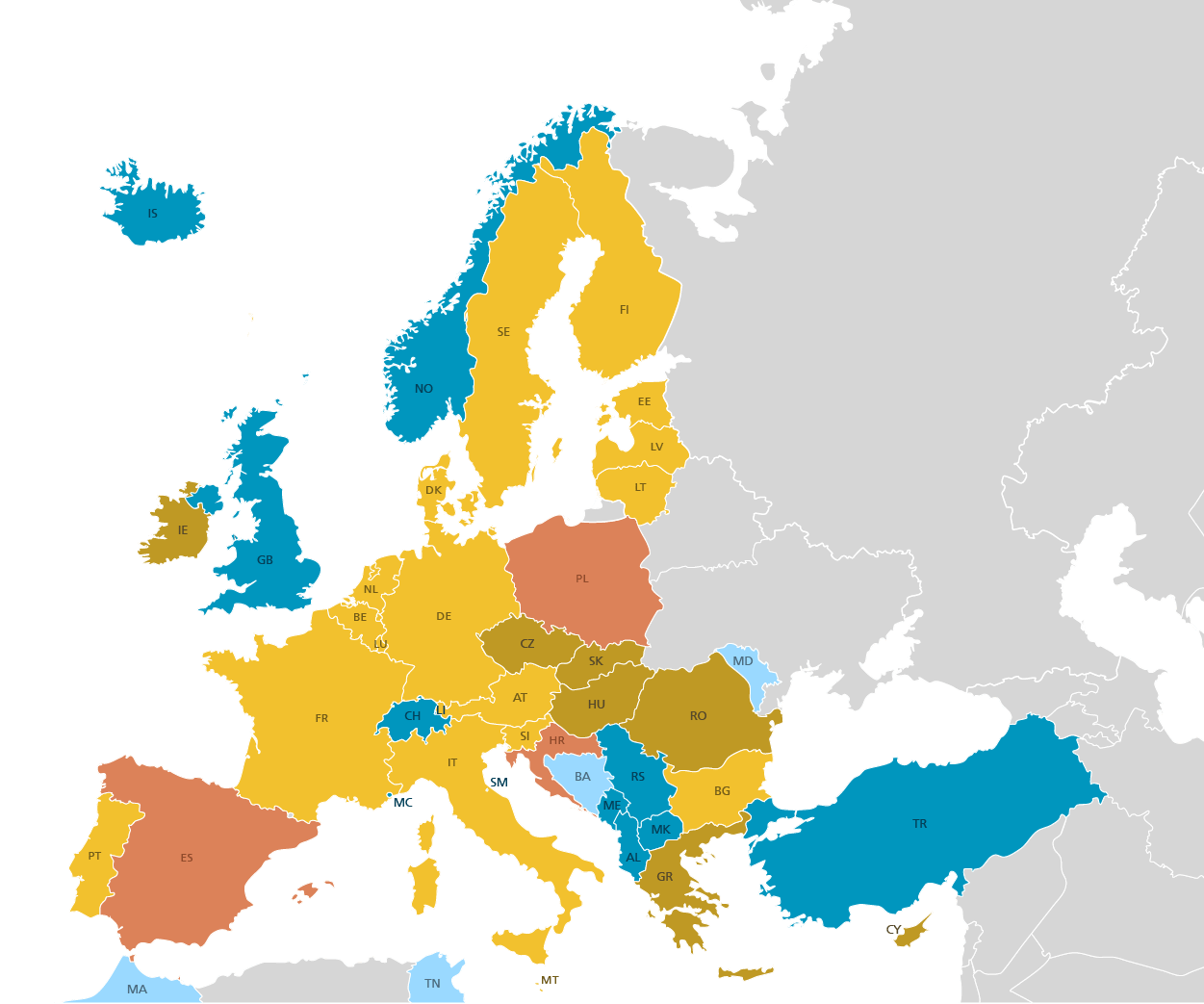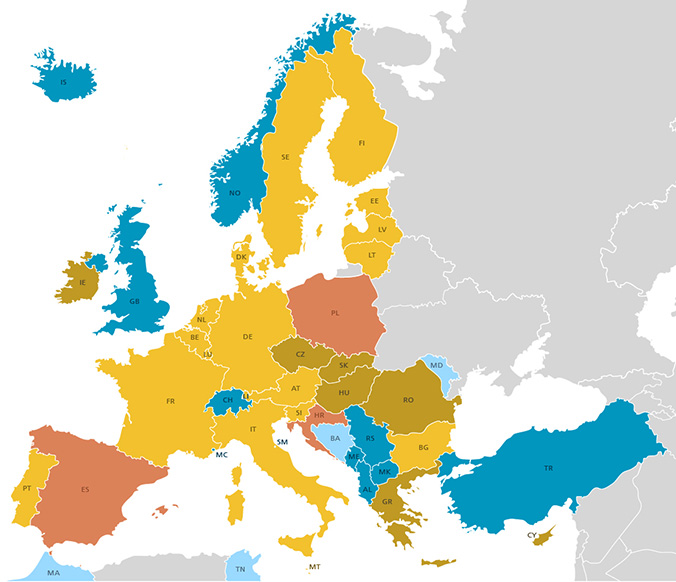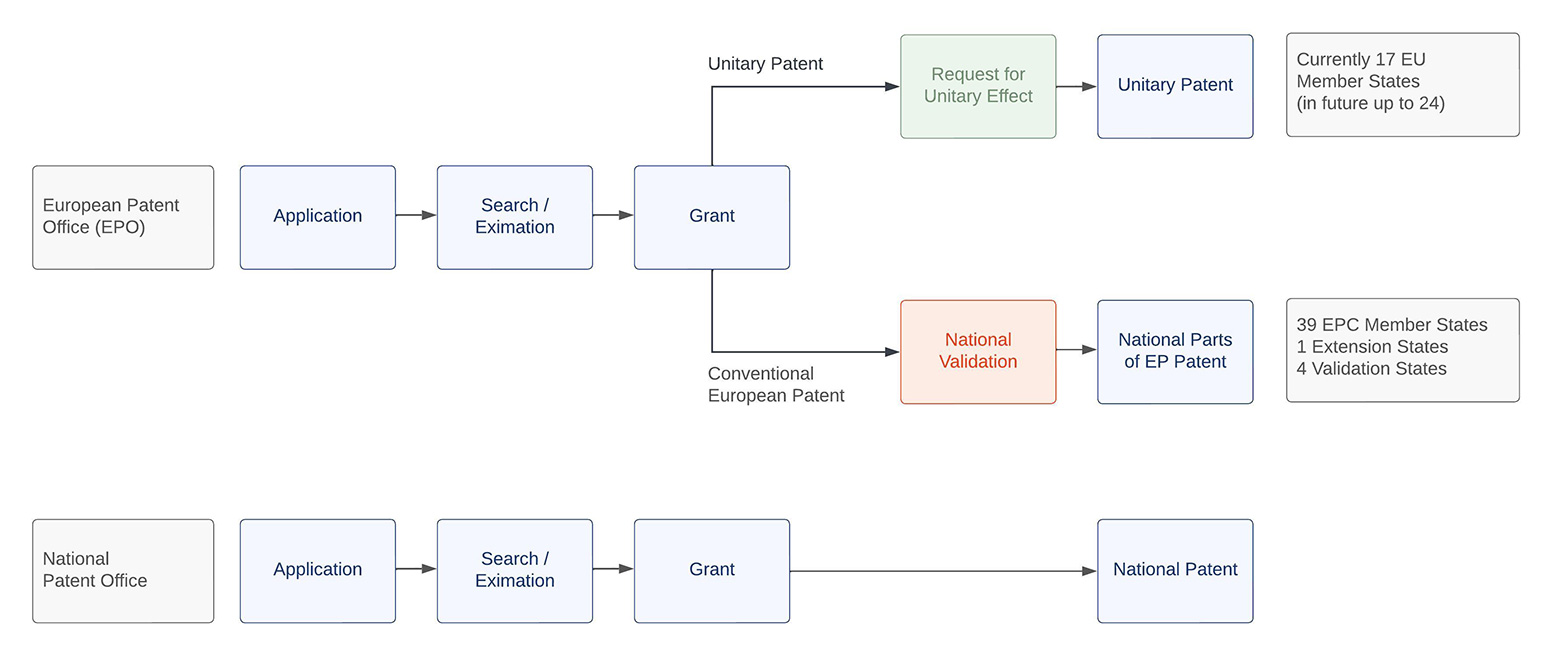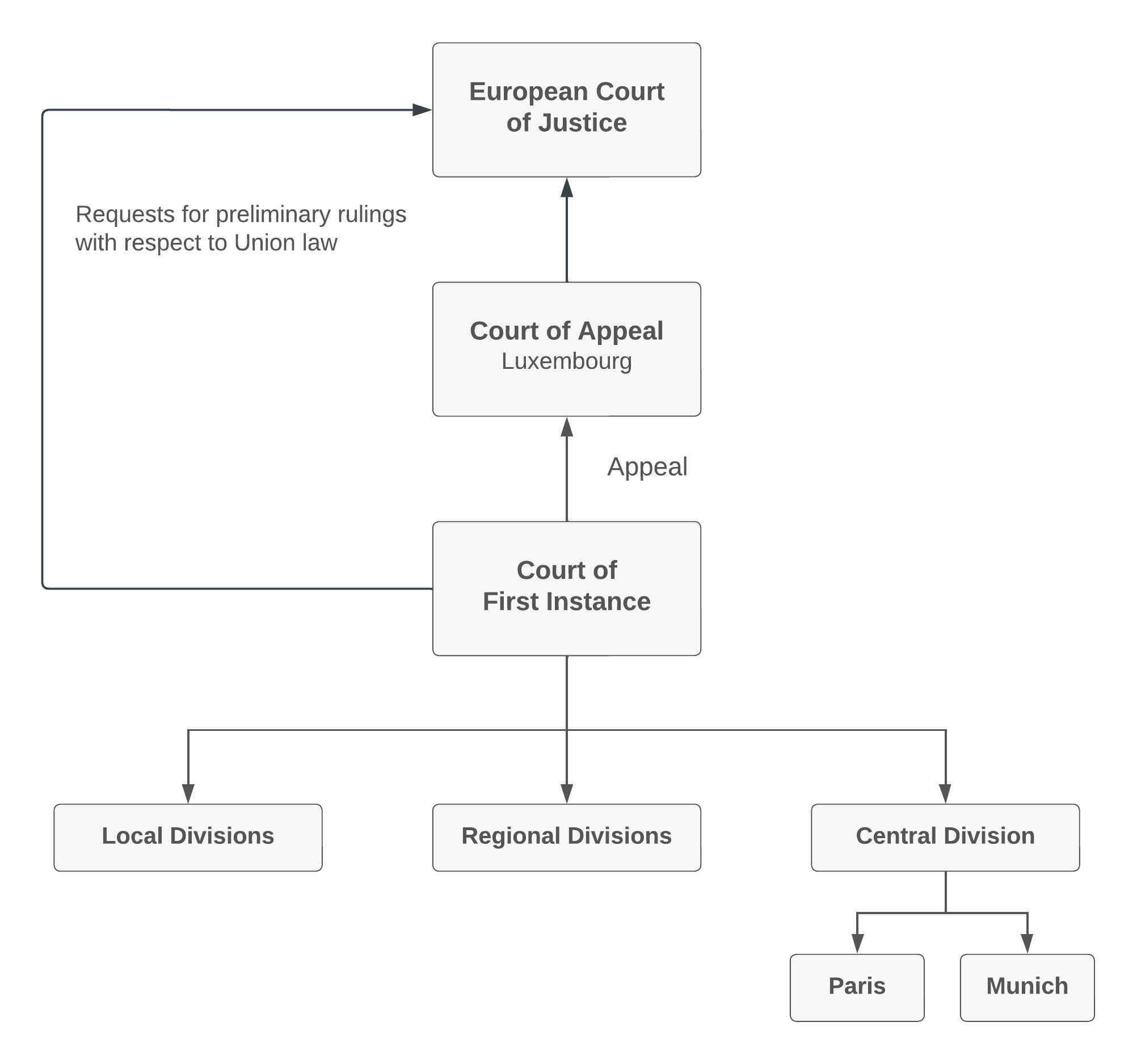Patent law
Member states of the European Patent Organisation
∎Currently participating EU Member States (ratification completed)
| Austria (AT) | Estonia (EE) | Luxembourg (LU) | Sweden (SE) |
| Belgium (BE) | Finland (FI) | Latvia (LV) | Slovenia (SI) |
| Bulgaria (BG) | France (FR) | Malta (MT) | |
| Germany (DE) | Italy (IT) | Netherlands (NL) | |
| Denmark (DK) | Lithuania (LT) | Portugal (PT) |
∎Participating EU Member States (ratification not yet completed)
| Cyprus (CY) | Greece (GR) | Ireland (IE) | Slovakia (SK) |
| Czech Republic (CZ) | Hungary (HU) | Romania (RO) |
∎Non-participating EU Member States
| Spain (ES) | Croatia (HR) | Poland (PL) |
∎States of the European Patent Convention which are not members of the EU
| Albania (AL) | Iceland (IS) | Montenegro (ME) | Serbia (RS) |
| Switzerland (CH) | Liechtenstein (LI) | North Macedonia (MK) | San Marino (SM) |
| United Kingdom (GB) | Monaco (MC) | Norway (NO) | Turkey (TR) |
∎Extension and validation states
| Morocco (MA) | Bosnia and Herzegovina (BA) | Tunisia (TN) |
| Republic of Moldova (MD) | Cambodia (KH) Not shown on the map |
 (Status June 2023)
(Status June 2023)
Unitary Patent System
The unitary patent system is an extension of the European patent system, which entered into force on 1 June 2023. Already before, there was a centralized application and examination procedure before the European Patent Office. With the Unitary Patent (UP) and the Unified Patent Court (UPC), the new system includes two additional components for strengthening patent protection in Europe.
European unitary patents make it possible to obtain protection in up to 24 EU member states (future) with a single application. This makes patent protection administratively simpler and, in the case of a larger geographical scope, also more cost-effective.
The Unified Patent Court is a new international court established jointly by the participating EU member states. After expiry of the transitional provisions, the Unified Patent Court will have exclusive competence for civil disputes relating to European patents (conventional or new unitary patents) and applications therefor which fall under the jurisdiction of these states. The new international court is intended to avoid costly parallel litigation before several national courts and to increase legal certainty.
The legal basis for the unitary patent system is formed by the Agreement on a Unified Patent Court (UPC) as well as by a number of further decrees.
As a leading IP law firm in Switzerland, RENTSCH PARTNER AG is able to perform all procedural acts concerning the Unitary Patent for you. Furthermore, several of our patent attorneys are authorized to represent before the Unified Patent Court.
Links:
www.epo.org/applying/european/unitary/unitary-patent.html
Unitary Patent
European patents with unitary effect are examined by the European Patent Office - just like conventional European patents. The application and grant procedure is the same. However, patent owners newly have the possibility to file a so-called request for unitary effect after grant.
The unitary effect has to be requested at the European Patent Office within one month after grant. This option is available for any European patent granted after the UPCA has entered into force. A prerequisite for this is that identical patent claims exist for all EU Member States participating in the UPCA.
Parallel to the European patent with unitary effect, there is still the possibility to validate conventional European patents. This is of course also be possible for EU Member States which have not or not yet ratified the UPCA (e.g. Spain or Poland), as well as for states of the European Patent Convention which do not belong to the EU (e.g. Switzerland, Liechtenstein, the United Kingdom or Norway). In addition, national patents will continue to exist.
One advantage of the new European unitary patent is that it can be obtained with a central application at the European Patent Office in all 17 EU Member States having ratified the UPCA (June 2023). Parallel validation procedures do no longer apply in these states. Furthermore, after a transitional period of six years (which can be extended to a maximum of 12 years), translations will no longer be necessary. Moreover, for a European patent with unitary effect, only one annual fee has to be paid directly to the European Patent Office, which is also responsible for maintaining the register, for example in the event of a change of ownership. The complexity of validation and maintenance is thus significantly simplified.
Another advantage of the new unitary patent are its costs. It is expected that the unitary patent is less costly than a conventional European patent, if it is validated in three to four or more participating EU Member States. With validation in a larger number of states (in future up to 24), the cost savings over the entire term of the patent can be significant.
One disadvantage of the new system is that important European production sites or sales markets do not participate. Examples of this include Switzerland, the United Kingdom, Spain and Poland. Furthermore, rights from a European unitary patent have to be enforced or defended before the new Unified Patent Court, for which there is as yet (June 2023) no practical experience. Especially with regard to the possibility of an invalidity action, which in case of success may lead to a central revocation of the patent in all participating EU Member States, there is thus some uncertainty for owners of European unitary patents.
Links:
www.epo.org/applying/european/unitary/unitary-patent.html
Unified Patent Court
The Unified Patent Court is a new international court established jointly by the EU Member States having ratified the UPCA.
Traditionally, national courts in the EU Member States have been responsible for civil disputes in connection with European patents, for example actions for infringement or nullity. This could lead to costly parallel proceedings in several states. In some cases, the judgments handed down in these proceedings were contradictory, which was at the expense of legal certainty.
After expiry of the transitional provisions, the Unified Patent Court will have exclusive competence for civil disputes concerning European patents and falling under the jurisdiction of the EU Member States having ratified the UPCA. This includes European patents with national validation (traditional) and unitary effect (new) as well as European patent applications and supplementary protection certificates (SPCs) for products protected by such patents.
The Unified Patent Court comprises a so-called Court of First Instance and a Court of Appeal. The Court of First Instance is composed of a central division and several local and regional divisions. The central division has its seat in Paris and initially (June 2023) one branch in Munich. The Court of Appeal has its seat in Luxembourg.
The new international court is intended to avoid costly parallel litigation before several national courts. The Unified Patent Court has set itself the task of delivering high-quality judgments in a comparatively short time. Furthermore, legal certainty is to be increased by harmonizing substantive patent law and case law.
As a non-EU country, Switzerland is not part of the UPCA, and the Swiss Federal Patent Court will continue to have primary competence over civil proceedings involving patents (national or EP with validation in Switzerland). However, Swiss parties are also able to enforce their patent rights in the EU Member States having ratified the UPCA before the Unified Patent Court. It is also possible for actions against Swiss parties falling under the jurisdiction of these states to be brought before the Unified Patent Court.
Links:
www.unified-patent-court.org
www.epo.org/applying/european/unitary/upc.html
Opt-Out
In the EU Member States having ratified the UPCA, the Unified Patent Court has primarily exclusive competence for civil proceedings relating to conventional European patents, new unitary patents, supplementary protection certificates (SPCs) and European patent applications. During a transitional period of at least seven years, actions for infringement or for declaration of invalidity may additionally be brought before national courts.
Owners of or applicants for a conventional European patent granted or applied for before the end of this transitional period will have the possibility to exclude the competence of the Unified Patent Court with regard to this patent, or the corresponding application, for its entire term (so-called "opt-out"). Thus, the national courts of the EU member states participating in the UPCA continue to retain their exclusive competence. The condition for an opt-out is that no action has previously been brought before the Unified Patent Court in respect of the corresponding IP right. The opt-out can be withdrawn at any time (so-called "opt-in"), provided that no action has previously been brought before one of the said national courts.
A request for opt-out must be filed directly with the Unified Patent Court and becomes effective upon entry in a register created for this purpose.
The decision whether existing or future conventional European patents, or applications therefor, should fall under the competence of the Unified Patent Court, or should better remain under the old system, will generally depend on the individual needs of the proprietor or applicant. However, due to the fact that there is still no practical experience with the Unified Patent Court (June 2023), an opt-out will have to be considered in many cases, especially with regard to the predictability of the outcome of proceedings and costs.
Why do you need a patent attorney?
For the legal enforcement of technical potential.
Patent attorneys support you in protecting your innovation against emulators. A patent attorney recognizes the nature of your invention and translates its essence into precisely formulated patent claims that finally define the scope of protection of your invention.
A patent attorney
- supports you in disputes and outlines options and strategies for optimally asserting your interests against any challenge;
- advises you on the correct application of expedient industrial property rights as well as on how to devise an optimal strategy for the protection of your innovative work;
- gives you an advantage over your competitors;
- helps you recognize and assess any risk exposure resulting from your competitors' industrial property rights.
What does a patent attorney do?
The patent attorney is the central point of contact for the legal protection of industrial property rights.
Patent attorneys advise clients on inventions, designs, trademarks, know-how as well as on how to protect software products and plant varieties. Patent attorneys represent clients before the Swiss Federal Institute of Intellectual Property, the European Patent Office and the World Intellectual Property Organization (WIPO). They work in support of any related application and examination processes before the pertinent authorities. Relying on their worldwide contacts with foreign consultants and other patent attorneys, patent attorneys coordinate application and examination processes abroad.
A patent attorney's main activities include:
- Filing applications for the protection of any type of proprietary industrial rights, domestically and internationally;
- Drafting expert opinions, oppositions, nullity claims, cancellation suits, objections and third-party submissions;
- Administering industrial property rights (monitoring of deadlines, payment of fees, etc.);
- Prosecuting infringements and defending against attacks on industrial property rights (in collaboration with legal specialists);
- Evaluating the industrial property rights of third parties and any collision risks;
- Researching prior art;
- Handling the official registration of transfers of industrial property rights;
- Advising on contract-related matters, specifically licensing agreements.
What is a patent attorney?
The patent attorney acts as an interface between technology, law and business.
Patent attorneys are university graduates in science or engineering, for example, with degrees in Physics, Chemistry, Biology or Engineering. In a supplementary course of study, patent attorneys acquire expert knowledge in intellectual property law, specifically patent law. European patent attorneys are licensed to practice before the European Patent Office.
Patent attorney
Also in Switzerland, a patent attorney is the person to contact if you want to protect your invention. He or she can represent you before national and regional patent offices. Please browse through the sub-categories on the left for more information.
The title „patent attorney“ is legally protected in Switzerland since July 1, 2011. The titles „Patentanwalt“, „Patentanwältin“, „patent attorney", „conseil en brevets“ or „consulente in brevetti" can be worn by a person who meets certain conditions defined in the law. The titles „European patent attorney", „consulente in brevetti europei", „europäische Patentanwältin", „europäischer Patentanwalt" or "european patent attorney" can only be worn by a person on the list of professional representatives maintained by the European Patent Office.
Protection of Technology Positions
Besides the actual patent administration, the protection of technology and patent positions play an important role in the IP management of a company. The own R&D activities of a company constitute one of the most essential sources for the own patent portfolio as well as for the evaluation of the own technology position compared to competitors, whereby such evaluation should be reasonably conducted corresponding to the different business units.
Professional patent administration requires also that a company, alongside its own patents, knows the other intellectual property rights in the respective business segment (especially of its most important competitors). The necessary information thereto may be obtained on the basis of the monitoring of the legal status of the patents concerned.
Important conclusions may be drawn from the technology as well as patent positions established that way. The technology and patent positions also allow for the reasonable coordination of both positions.
Rentsch Partner Ltd., thanks to the use of advanced technology and know-how, is able to professionally administrate and efficiently manage extensive patent portfolios.
Page 1 of 3
News
-
12 Apr 2024
-
27 Mar 2024
-
21 Mar 2024
-
8 Mar 2024
-
8 Mar 2024
-
15 Feb 2024
-
11 Jan 2024
- Information
Announcement of our 2024 promotions
-
12 Dec 2023
-
21 Nov 2023


